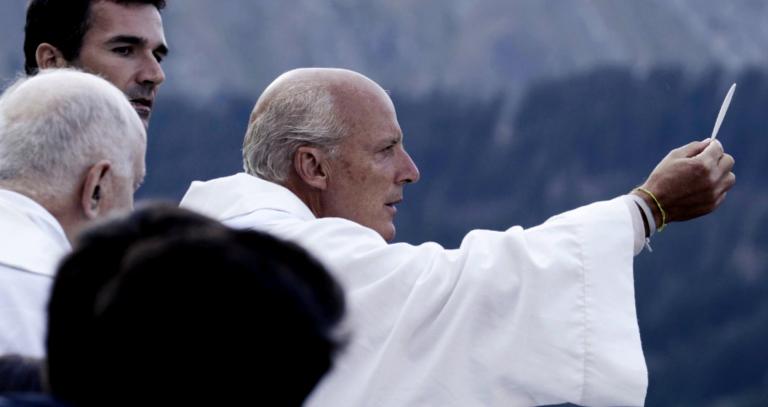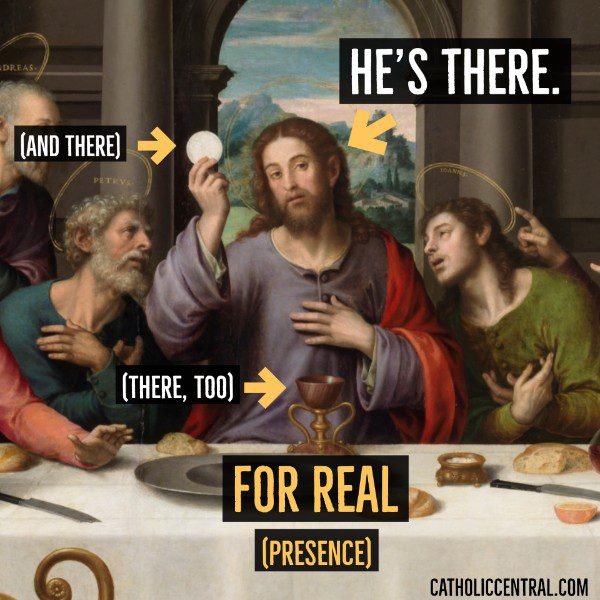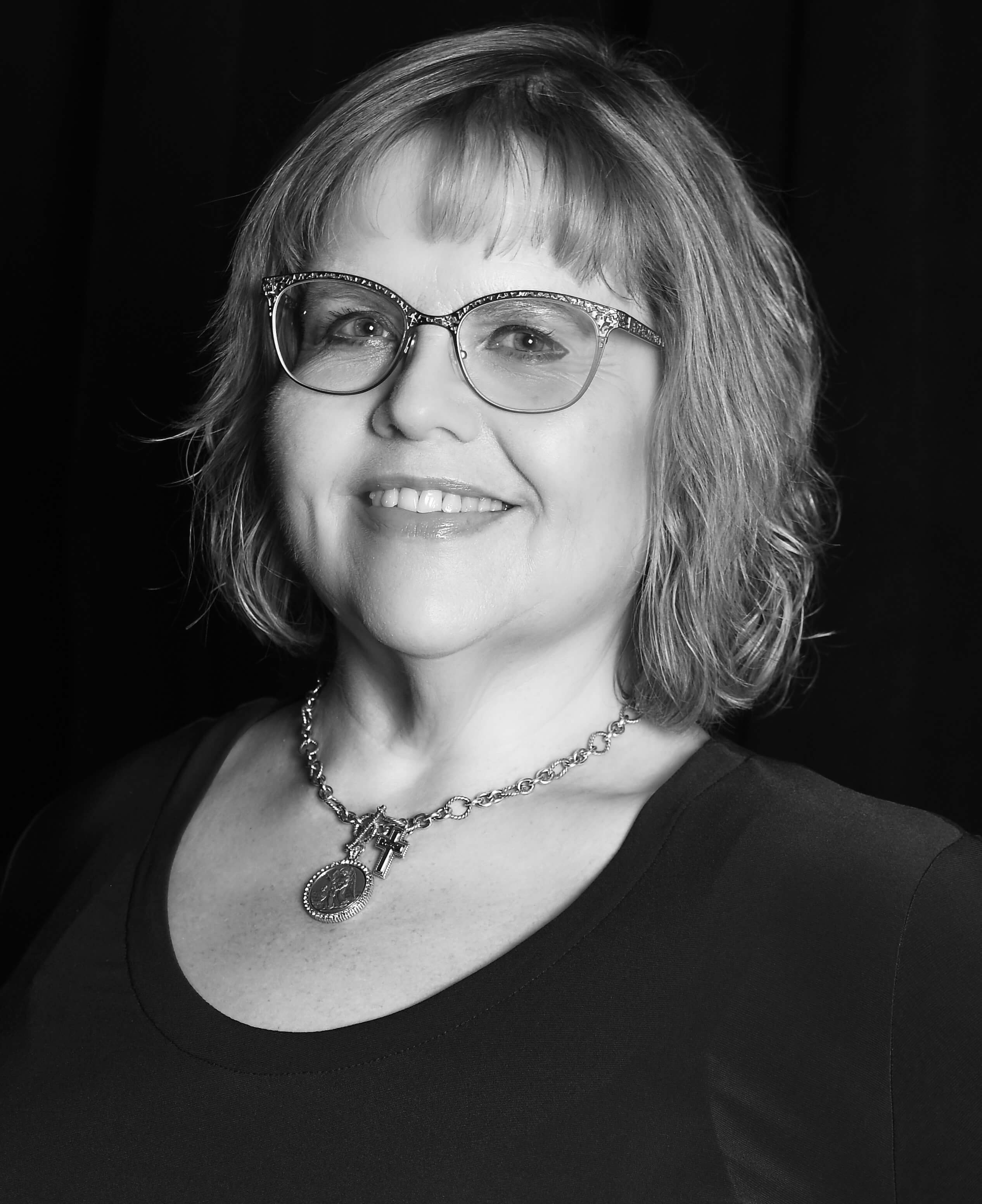
UPDATE 6/15: Fathom Events brings ALIVE: Who Is There? back to theaters for one more night, on Tuesday, June 21. Click here for tickets.
On April 25, for one night only, Fathom Events releases ALIVE: Who Is There?, a subtitled Spanish film (original title Vivo) that recounts the experiences of people whose encounters with Christ in the Eucharist during adoration radically altered the courses of their lives.
For Catholics, Jesus doesn’t only exist in Heaven or in stories of His works on paper. The Word became Flesh — and Blood and Soul and Divinity — and He’s stayed that way. Only now, on Earth, He can look like a little wafer (or a glass of wine).
Here’s a graphic I did in my day job to illustrate that idea:

You can also check out this explanatory (and pretty funny) episode of Catholic Central, produced by Family Theater Productions:
Spiritually, Christ is always and everywhere with us. But we’re earthly creatures, so there’s something special about having a thing to focus on — not just a picture, a statue, or words on a page, but a thing that is the real thing, the Real Presence of Jesus Christ.
The notion that when a priest consecrates a host (or a chalice), and it becomes the Body, Blood, Soul and Divinity of Christ, under the appearance of bread (or wine), is a controversial one.
When Christ first proposed that believers must eat His Flesh and drink His Blood, as recounted in Chapter 6 of the Gospel of John, a bunch of disciples hit the road. But He never wavered from that teaching, despite the reaction.
Catholics believe that, at the Last Supper, Christ demonstrated how we were to do what He asked. His Body became bread, and His Blood, wine. Today, Catholic doctrine states that the fullness of Christ is in both the bread and the wine, and consuming either at communion is sufficient.
But if you’re going to gather for adoration, to sit in the presence of Christ, that’s ordinarily done with a Consecrated Host, displayed in some kind of holder, called a Monstrance.
Adoration allows a disciple to sit quietly at the feet of the Master. There might music, or not. You can read, write, pray or do nothing at all. It’s a bit of a challenge for the monkey-minded of the modern world, but as ALIVE shows, it can be very powerful.
The film also includes an extra section, much of it in English, featuring interviews with such figures as “media nun” Sister Nancy Usselmann, fsp, of the Daughters of St. Paul; a priest who is a former Baptist; and Bishop Andrew Cozzens, chairman of the USCCB’s Committee on Evangelization and Catechesis.
Here’s the trailer:
I did an email Q&A with Lucía González-Barandiarán, founder and CEO of Bosco Films in Spain, which is distributing Alive, produced and filmed in Spain by Hakuna Productions. Here’s what she had to say:
How and why did this film begin?
ALIVE (VIVO) was an idea of Fr. José Pedro Manglano, we call him Josepe, he leads movement of young people in Spain called Hakuna, they have the approval from the Catholic Church in Spain. This group of young people started to compose their own music to play during the Eucharistic adoration.
Suddenly the group started to grow, and they became a big movement and they wanted to share what is happening during adorations and how many people changed their life and turn to God, so the idea of the movie started,
They united four testimonies from real people, non-fiction, is real, three young people and a married couple, that were non-believers, but they experienced God in their life.
How were the interview subjects found?
They are from Hakuna, Fr. Josepe had knowledge of their testimonies and asked them to be part of the film.
We’ve all heard about the decline of the Faith in Europe — but the opposite was true about the people interviewed. What about their stories was most surprising?
It is true that in Europe there is a great crisis of faith, and the testimonies shown in the film are not distant to that reality, but at the same time, we see hope, that hope that is born from the young people to make known a living Jesus, and that they want everyone to know Him. Therefore, each of the testimonies of the film surprised us because they are radical changes of thought and life, they do have an encounter with a Living God, that one says, only the love of God is capable of that
What can we learn from these stories to reignite belief in the Real Presence among Catholics?
It is sad that Catholics don’t believe in True Presence. There is a Pew study in 2019 in United States among Catholics and revealed that 7 out of 10 believe that the Body and Blood are merely symbols.
When we see the testimonies in ALIVE, we learn from the love, the passion, the authenticity with each one of the testimonies refers to God, the Living God they found in a Holy Hour. They talked about the power, the peace that they discovered in front of Body, Blood, Soul and Divinity in the Blessed Sacrament.
They are regular men and women that didn´t believe; they are not celebrities. The main celebrity — the main character — is Jesus Christ. When you see their faces, you see the love they have for that living God.
Would there ever be a version of this in other countries?
We don’t know, but this film has been already in 14 countries, this message is universal, it touched hearts wherever it has been seen and moved people to a Eucharistic Revival, and now we hope the same thing happens in the United States this Monday, April 25th at 7 p.m.
CLICK HERE TO FIND TICKETS IN YOUR AREA
Most of your interview subjects are quite young. Do they represent an unsatisfied need for faith among young people?
It is impressive to see how young people embrace the love of God, and the testimonies that we see in the film show how much they need God in their lives and did not know it.
When young people meet God, they begin to heal many wounds of the heart. These are wounds of love so strong that they often lead them to their own destruction through drugs, alcohol. They do not have true friendships, and they often escape from reality.
We need to bring God to the youth. Most of them live without hope, just live without a reason. But when they meet God, they are filled with His love and mercy and they do not want to let go of Him. They want Him in their lives, and they heal their wounds and live with hope.
What’s next for your company?
Bosco Films will continue taking ALIVE to other countries that people asked for it, and we are next to releases this year in Latin American two more faith-based Spanish films: Claret, that is about St. Antonio Maria Claret, he was an archbishop and missionary, and another movie about St. Santa Vicenta María called La sirvienta, it means “the maid.” Also we started to film a new documentary called Duc in Altum: a journey into man’s inner self, that will be released next year.
Once again, to find tickets to see ALIVE on Monday night in your area (if it’s showing there), click here.
Image: Fathom Events/Bosco Films
Don’t miss a thing: Subscribe to all that I write at Authory.com/KateOHare














